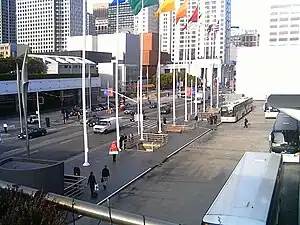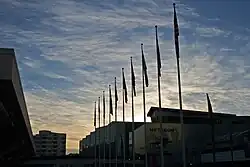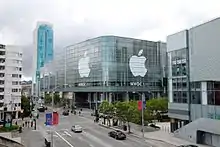Moscone Center
The George R. Moscone Convention Center[5] (pronounced /mɒsˈkoʊni/), popularly known as the Moscone Center, is the largest convention and exhibition complex in San Francisco, California, United States. The complex consists of three main halls spread out across three blocks and 87 acres (35 ha) in the South of Market neighborhood.[4] The convention center originally opened in 1981. It is named after San Francisco former mayor George Moscone, who was assassinated in November 1978.
| Moscone Center | |
|---|---|
 Colored flags outside the Moscone Center | |
| Address | 747 Howard Street San Francisco, California 94103 |
| Coordinates | 37.784173°N 122.401557°W |
| Owner | City and County of San Francisco |
| Operator | ASM Global |
| Built | 1981 (Moscone South)[1] |
| Architect | |
| Opened | 1981[1] |
| Expanded | |
Construction cost |
|
| Enclosed space | |
| • Total space | over 2,000,000 sq ft (190,000 m2) |
| • Exhibit hall floor | 1,500,000 sq ft (140,000 m2) |
| • Breakout/meeting |
|
| Parking | Pay parking nearby |
| Public transit access | |
| Website | |
| www | |
History

The South of Market Area where Moscone Center was built was claimed by the San Francisco Redevelopment Agency, and a protracted battle was fought by the displaced low-income residents during the 1960s and 1970s.[6][7]
Although the center is named after the murdered mayor, Moscone initially opposed the development of the area when he served on the SF Board of Supervisors in the 1960s because he felt it would displace elderly and poor residents of the area. As mayor, Moscone convened a special committee of proponents and opponents of a convention center. Hearings were held throughout SF seeking citizen input. A compromise was reached which was supported by Moscone. He put the matter on the ballot in November 1976 and it passed overwhelmingly.
The original Moscone Convention Center hall opened in 1981 on the site of what is now known as Moscone South. It was designed by a team at Hellmuth, Obata & Kassabaum led by Bill Valentine. The exhibition hall was placed underground to minimize the controversial convention center's visible footprint.[4]
Moscone Center was featured in the 1995 movie The Net, with Sandra Bullock.
The expansion of Moscone North and Moscone West in 1992 and 2003, designed by Gensler with Hunt Construction Group as the general contractor, added an additional 600,000 square feet (56,000 m2) to its original 300,000 square feet (28,000 m2) of exhibit space.[2]
Moscone North and South underwent a two-year renovation project that was completed in 2012. The renewal project was designed by HOK, the center's original architect. A $551 million expansion project is underway, which was scheduled for completion in December 2018. The aboveground portions of Moscone South have been demolished and replaced by a more spacious structure. Moscone North was also renovated. The expansion project was designed by Skidmore, Owings & Merrill in collaboration with Mark Cavagnero Associates.[4]
Facilities
The Moscone Center complex consists of three main halls:
- Moscone South is located to the south of Howard Street. It is three stories tall. It opened in 2017, replacing the original Moscone Center building that opened in 1981.[4] A Keith Haring sculpture stands outside the hall at the corner of 3rd and Howard streets.[8]
- Moscone North is located to the north of Howard Street.
- Moscone West is a three-level exhibition hall located across 4th Street from Moscone North.
Moscone North and South are connected by a pedestrian bridge over Howard Street, as well as by the underground exhibition hall, which extends far beyond the aboveground structures and beneath Yerba Buena Gardens and the Metreon entertainment center. The massive underground hall has been described as a bunker.[9][4] Together, Moscone North and South have 504,000 square feet (46,800 m2) of contiguous exhibition space, two ballrooms, 82 meeting rooms, and 107,000 square feet (9,900 m2) of pre-function lobby space.[10]
A large solar electricity system was installed on the roof of the center in March 2004 by PowerLight Corporation. The installation of this system marked San Francisco's first major step towards obtaining all municipal energy from pollution-free sources. With the 60,000-square-foot (5,600 m2) solar array (675 kW capacity) in place, San Francisco boasts one of the largest city-owned solar installations in the country. The electricity generated by the solar system, combined with savings from energy efficiency measures, delivers the equivalent energy to power approximately 8,500 homes.
The location of the complex in the South of Market area provides easy access to downtown San Francisco's many hotels and restaurants, as well as major transportation systems. The center is two blocks away from the Powell Street station, which is served by both BART and Muni Metro. When complete, the Yerba Buena/Moscone station will also bring Muni Metro service to the southwestern corner of the convention center complex and provide connectivity with Caltrain.
Labor organizations supported the construction of the center, and were granted full labor jurisdiction. All labor in the Convention Center is performed by I.A.T.S.E. Local 16 Stagehands, Sign and Display Workers Local #510, Brotherhood of Teamsters local #65, IBEW Local #6, Security I.A.T.S.E. Local #B-18, Communications Workers of America, and the Hotel & Restaurant Workers Local #2. IUOE Local #39 provides Engineering Services. Projection Presentation Technology is the on-site rental service.[11]
Events
Moscone Center hosts many large events each year. During the 2016–17 season, Moscone Center hosted 74 events with a total attendance of 1,021,031.[12]

Moscone Center hosts a number of annual professional gatherings, including:
- American Bar Association annual meeting
- Dreamforce (since 2005)[13]
- Game Developers Conference (2005, since 2007)
- Oracle OpenWorld (since 1997)[14]
- Pacific Coast Builders Conference
- RSA Conference (2001, 2003–2005, since 2007)
- SEMICON West (since 1992)[15]
- Winter Fancy Food Show
- SPIE Photonics West
In addition, Moscone Center hosts public gated events such as the SF Auto Show and the Fancy Foods Show.

Moscone Center formerly hosted the following annual events:
- American Geophysical Union fall meeting (until 2016)
- Apple Worldwide Developers Conference (2003–2016)
- Google I/O (2008–2015)
- JavaOne (1997–2009, 2017)[16][17]
- Macworld/iWorld (1985–2014)
- Microsoft Build (2013–2016)
- VMworld (2007, 2009, 2010, 2012–2015, 2019)
- West Coast Computer Faire (1984–1991)
- WonderCon (2003–2011)
- Intel Developer Forum (2002–2016)
Other notable events at the convention center have included:
- 1984 Democratic National Convention, at which the Democratic Party nominated Walter Mondale for President of the United States and Geraldine Ferraro for Vice President, marking the first time a woman had been nominated by a major party for either office
- 1987 National Sports Collectors Convention
- 1992 and 1996 Microsoft Professional Developers Conference
- 1993 World Science Fiction Convention
- 2000 President Bill Clinton spoke in the Esplanade Ballroom and recorded a weekly radio address in the Green Room
- 2009 OpenSource World
- 2015 TwitchCon
- 2015 PlayStation Experience
- 2015 Capcom Cup
- 2016 NFL Experience
- 2016 North American International Auto Show
- 2017 GMSA Mobile World Congress Americas
See also
References
- Walsh, D. (December 20, 1995). $157 million sought to expand Moscone, San Francisco Chronicle.
- Epstein. E. (February 13, 1996). Moscone Expansion is Part of Trend, San Francisco Chronicle.
- Levy, D. (January 19, 2003). Worries rise as Moscone expansion nears opening, San Francisco Chronicle.
- King, John (September 11, 2017). "New Moscone Center strives for elegance amid enormity". San Francisco Chronicle. Retrieved June 10, 2018.
- "Meeting Agenda, Budget and Finance Sub-Committee" (PDF). City and County of San Francisco. April 13, 2017. p. 3. Retrieved April 9, 2018.
- Hartman, Chester. 1974. Yerba Buena: Land Grab and Community Resistance in San Francisco. San Francisco: Glide Publications.
- Hartman, Chester. 1984. The Transformation of San Francisco. Totowa, NJ: Rowman & Allanheld.
- "New Public Art by Renowned Artists Add to Gardens' Canvass". Yerba Buena Gardens. August 19, 2019. Retrieved May 4, 2021.
- Floor Plans, Moscone Center.
- "The Moscone Center Expansion" (PDF). Moscone Center. May 3, 2018. p. 2. Retrieved June 10, 2018.
- "Moscone Center : Contractor Guidelines". www.moscone.com.
- "Attendance & Utilization". Moscone Center. Retrieved June 10, 2018.
- Goh, Gabey (October 5, 2016). "Dreamforce 2016 kicks off in San Francisco". Campaign Events Impact. Retrieved June 10, 2018.
- Oracle OpenWorld San Francisco 2008 (PDF). Oracle OpenWorld. San Francisco: Oracle Corporation. September 21–25, 2008. p. 9. Retrieved June 10, 2018.
- LaPedus, Mark; Clarke, Peter (May 27, 2004). "Semicon West to move into one venue in 2005". EE Times. Retrieved June 10, 2018.
- Day, Bill (May 1, 1997). "Java grows up". JavaWorld. International Data Group. Retrieved June 10, 2018.
- McKenzie, Cameron (September 2017). "JavaOne 2017 walks a new path". TheServerSide. TechTarget. Retrieved June 10, 2018.
External links
- Moscone Center official website
- Moscone Convention Center Interactive Map
- Moscone Center Solar Power data analysis
- Information about the solar installation on the roof of Moscone Center
- Things to do in and near Moscone Center
- Moscone Center Visitors Guide
- Museum Parc Garage - nearby parking for visitors for Moscone